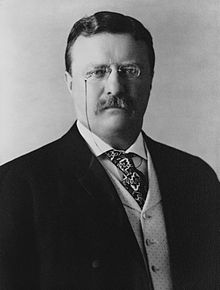Roosevelt Corollary
The Roosevelt Corollary was promulgated on December 6, 1904, by U.S. President Theodore Roosevelt in his annual message to Congress as an amendment to the Monroe Doctrine.
With the Corollary, Roosevelt decisively changed the previous interpretation of the Monroe Doctrine. Whereas the Monroe Doctrine had merely rejected the right of European powers to intervene on the American continent, Roosevelt also postulated an explicit arbitration function for the United States, combined with the right to intervene in internal American conflicts. Even though the USA had repeatedly intervened in conflicts involving other American states before 1904, this was not clearly compatible with the original content of the Monroe Doctrine, according to which the American states would settle their affairs alone, without Europe. Consequently, earlier interventions by the USA had always met with sometimes vehement resistance at home. President Roosevelt thus broke with a long tradition of isolationism in American foreign policy. In doing so, he met with harsh criticism at home: he was accused of acting against the dictates of the Constitution of the United States of America, of breaking international law, and of pursuing a militaristic and imperialistic foreign policy.
The "Roosevelt Amendment" to the Monroe Doctrine in excerpts:
"When a nation shows that it knows how to act reasonably and with force and propriety in social and political matters, that it keeps order and pays its debts, it need fear no interference on the part of the United States. Constant wrong-doing or an inability which amounts to a loosening of the bonds of civilized society may, in America as elsewhere, eventually call for intervention by some civilized nation, and in the Western Hemisphere the adherence of the United States to the Monroe Doctrine may, in flagrant cases of such wrong-doing or inability, compel it, though against its will, to exercise an international police power."
The Roosevelt Corollary is therefore also exemplary for the high phase of modern imperialism, in which the USA, after initial restraint, participated in the efforts of the European colonial powers to "divide up the world". Subsequently, the USA intervened in various Central American states with military interventions and the stationing of troops, in some cases for many years, for example in Haiti, Nicaragua and the Dominican Republic.
After relations with South and Central America had improved considerably under President Herbert Hoover and the last US forces had been recalled from Nicaragua and Haiti, his successor Franklin D. Roosevelt finally revoked the Corollary in order to pursue other paths of domestic American cooperation (but also control) within the framework of his predecessor's Good Neighbor Policy. Roosevelt finally revoked the Corollary in order to pursue other avenues of domestic American cooperation (but also control) within the framework of his predecessor's Good Neighbor Policy.

The American President Theodore Roosevelt
See also
- List of United States military operations
- Gunboat Policy
- big stick
Search within the encyclopedia